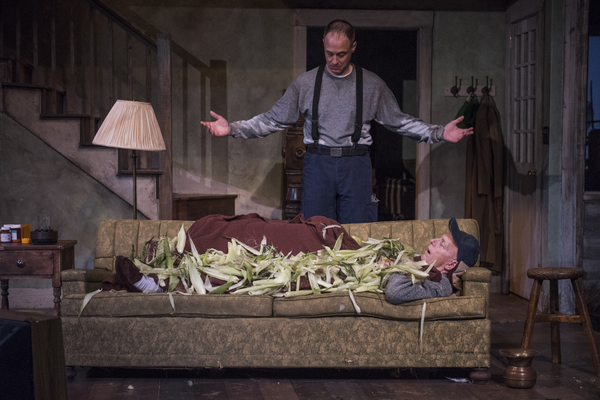Buried Child Exposes the Slow Death of the American Dream
Larry Yando leads Kimberly Senior’s production of this modern American classic.

(© Michael Brosilow)
Sam Shepard's Buried Child won the Pulitzer Prize for Drama in 1979, decades before the current journalistic obsession with profiling disenfranchised rural men in so-called flyover states. In 2018, at Glencoe's Writers Theatre, the darkly comedic portrait of a dysfunctional Midwestern family continues to reflect the hopelessness and anger that come with a loss of identity as sharply as it did nearly 40 years ago.
This particular unhappy family is led by patriarch Dodge (Larry Yando), a dying, homebound drunk, and his sanctimonious wife, Halie (Shannon Cochran). Dodge and Halie shout lovelessly at each other from different rooms of their dilapidated farmhouse. Their eldest son, Tilden (Mark L. Montgomery), has recently returned from a 20-year absence following "some trouble in New Mexico." Younger son Bradley (Timothy Edward Kane) lives nearby and assumes responsibility for his parents, to Dodge's chagrin. Their third son, Ansel, died some years back and has become a blessed martyr in his mother's eyes, a perfect golden boy against whom her living sons could never measure up.
Into this mess walks Vince (Shane Kenyon), Tilden's estranged adult son. Vince decides to surprise his family with an impromptu reunion, against the advice and wishes of his girlfriend, Shelly (Arti Ishak). When they arrive at the family homestead, Dodge doesn't recognize Vince, and even Tilden barely acknowledges the man who claims to be his son. While a rainstorm rages outside, the family, along with Shelly, jockey for power and fight to defend long-buried secrets.
In Yandos's capable hands, Dodge has surprising vigor: Age and infirmity has reverted him into a temperamental, fussy man-child. He demands respect but commands none, least of all from Halie, whom Cochran plays with a dim facade of gentility covering up her many sins. As the dissociative Tilden, Montgomery has the gift of austerity, eking out expressions that reveal very little but convey a great deal. In brilliant contrast, Ishak's Shelly is an open book, equally expressive when trying to assert control or pacify the family. In the third act, Ishak and director Kimberly Senior subtly refocus the play on Shelly, the woman whose repeated and agitated concerns go unacknowledged for too long by the men onstage.
Along with her design team, Senior has crafted a grim, surreal production that refracts the disappointments of the American dream deferred in a way that seems pointedly topical. Dodge is the master of a once-prosperous land that hasn't produced a healthy crop since 1935. The family is collapsing from within, dragged down by their own mistakes and weaknesses, just as Dodge's body is breaking down from drinking, smoking, and refusing to take his medication. Jack Magaw's set illustrates the broken-down spirit of the family with a dusty, sparse farmhouse whose uneven floors show the slightest hint of surreality. Mikhail Fiksel's relentless sound design and Heather Gilbert's gauzy lighting capture the oppressive storm that pounds against the walls of the homestead, trapping all within.
This Buried Child critically examines a dwindling American dream and the anger of a disenfranchised population that expected to see that dream come true. Senior's strong directorial voice and her distinguished cast have tackled Shepard's classic so that it can be seen, in 2018, with fresh eyes.








